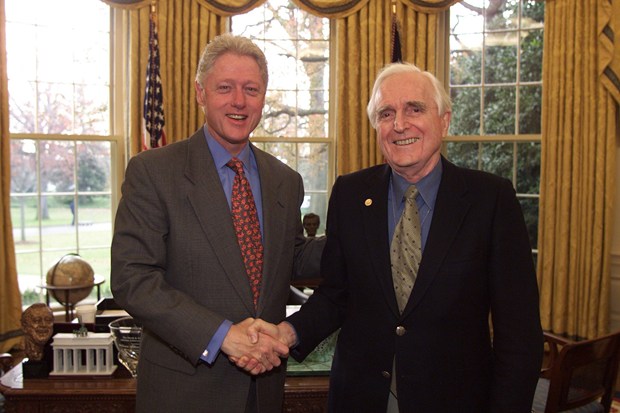|
![]()
| Doug Engelbart Map1 #278410 Douglas Carl Engelbart (January 30, 1925 – July 2, 2013) |  From the Doug Engelbart Institute: "Dr. Douglas C. Engelbart had an unparalleled 50-year track record in predicting, designing, and implementing the future of organizational computing. From his early vision of turning organizations into augmented knowledge workshops, he went on to pioneer what is now known as collaborative hypermedia, knowledge management, community networking, and organizational transformation. Well-known technological firsts include the mouse, display editing, windows, cross-file editing, outline processing, hypermedia, and groupware. Integrated prototypes were in full operation under the NLS system, as early as 1968. In the last decade of its continued evolution, thousands of users have benefited from its unique team support capabilities.
After 20 years directing his own lab at SRI, and 11 years as senior scientist, first at Tymshare, and then at McDonnell Douglas Corporation, Engelbart founded the Bootstrap Institute (now the Doug Engelbart Institute*), where he worked closely with industry and government stakeholders to launch a collaborative implementation of his work for over a decade.
Engelbart received numerous awards for outstanding lifetime achievement and ingenuity, including the National Medal of Technology, the Lemelson-MIT Prize, and ACM's 1997 A.M. Turing Award. His life's work, with his "big-picture" vision and persistent pioneering breakthroughs, has made a significant impact on the past, present, and future of personal, interpersonal, and organizational computing.
See also Doug Engelbart Bio, Patents, Awards, Curriculum Vitae, five-page biographical sketch A Lifetime Pursuit, Bibliography, and Press pages." |
+Citations (6) - CitationsAdd new citationList by: CiterankMapLink[1] The Engelbart Hypothesis: Dialogs with Douglas Engelbart
Author: Valerie Landau, Eileen Clegg, Douglas Engelbart
Cited by: David Price 12:17 PM 12 July 2013 GMT
Citerank: (1) 231359More about DougMore biographical information about Doug Engelbart – including videos, interviews and reflections on Doug's life.609FDDBE
URL: | | Excerpt / Summary Douglas Engelbart, inventor of the computer mouse, is proclaimed as a Silicon Valley visionary. Until now his message has been limited to the High Tech elite. His hidden legacy lies with his ideas that laid the foundation for the shift from the Industrial to the Information Age. The Engelbart Hypothesis clearly articulates his message for the first time in 50 years–– shedding light on the secrets long ignored about the potential of the internet, social networking, and a method for harnessing collective intelligence. By understanding this framework, large groups of people can unleash their full potential to augment natural intelligence for collaborative problem-solving.
A host of luminaries explain Engelbart's influence on their work including:
Vint Cerf, Evangelist, Google
Kristina Woolsey, Cognitive Scientist
Lev Gonick, Vice President, Case Western Reserve
Howard Rheingold, author of “Smart Mobs"
and others |
Link[4] Augmenting Human Intellect: A Conceptual Framework
Author: Douglas C. Engelbart
Publication info: 1962 October
Cited by: David Price 10:45 PM 21 August 2013 GMT
Citerank: (1) 31458Doug Engelbart's VisionAugment Collective IQ to help address the complex, urgent problems humanity faces.57DE7179
URL: | | Excerpt / Summary By "augmenting human intellect" we mean increasing the capability of a man to approach a complex problem situation, to gain comprehension to suit his particular needs, and to derive solutions to problems. Increased capability in this respect is taken to mean a mixture of the following: more-rapid comprehension, better comprehension, the possibility of gaining a useful degree of comprehension in a situation that previously was too complex, speedier solutions, better solutions, and the possibility of finding solutions to problems that before seemed insoluble. And by "complex situations" we include the professional problems of diplomats, executives, social scientists, life scientists, physical scientists, attorneys, designers--whether the problem situation exists for twenty minutes or twenty years. We do not speak of isolated clever tricks that help in particular situations. We refer to a way of life in an integrated domain where hunches, cut-and-try, intangibles, and the human "feel for a situation" usefully co-exist with powerful concepts, streamlined terminology and notation, sophisticated methods, and high-powered electronic aids.
Man's population and gross product are increasing at a considerable rate, but the complexity of his problems grows still faster, and the urgency with which solutions must be found becomes steadily greater in response to the increased rate of activity and the increasingly global nature of that activity. Augmenting man's intellect, in the sense defined above, would warrant full pursuit by an enlightened society if there could be shown a reasonable approach and some plausible benefits.
This report covers the first phase of a program aimed at developing means to augment the human intellect. These "means" can include many things--all of which appear to be but extensions of means developed and used in the past to help man apply his native sensory, mental, and motor capabilities--and we consider the whole system of a human and his augmentation means as a proper field of search for practical possibilities. It is a very important system to our society, and like most systems its performance can best be improved by considering the whole as a set of interacting components rather than by considering the components in isolation. |
|
|